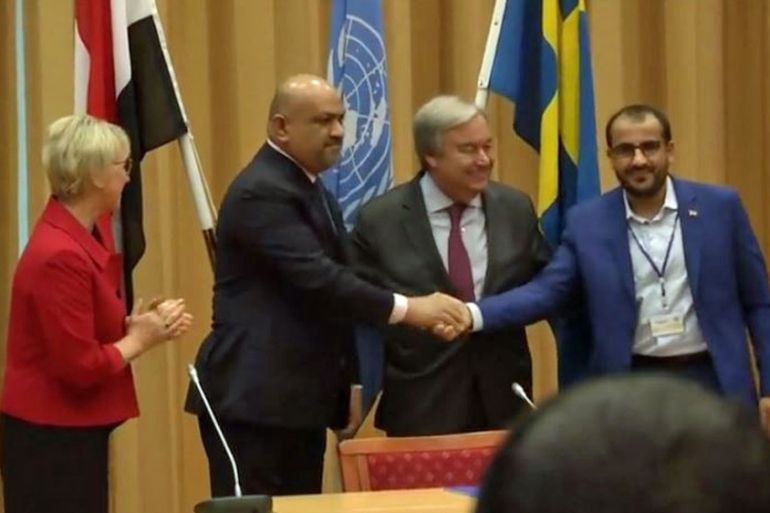UN sets Hodeidah ceasefire date for December 18: Houthi official
Truce brokered by UN between pro-government forces and Houthi rebels set for December 18, Houthi official says.

The UN has scheduled the start of a ceasefire between Yemen‘s pro-government forces and Houthi rebels in the city of Hodeidah for December 18, a spokesperson for the Houthi leadership told Al Jazeera.
Hodeidah has seen sporadic clashes since Friday, residents said, the first violence to hit the port city since warring parties reached an UN-brokered ceasefire in Sweden on Thursday.
Keep reading
list of 4 itemsUS sanctions shipping firm accused of links to Iran, Yemen’s Houthis
Vessel struck in Red Sea as Houthis promise attacks on more shipping lanes
What we know about deadly Houthi attack on cargo ship
Residents reported hearing gunfire and missile blasts in the Houthi-held city, where Yemeni forces backed by a Saudi-UAE-led coalition have massed on the outskirts.
The clashes in Hodeidah, whose port is a lifeline for millions of Yemenis facing starvation, came after the Houthis and the Saudi-backed government agreed to cease fighting and withdraw their troops, after a week of consultations in Sweden that ended on December 13.
It was the first significant breakthrough for the UN-led peace efforts, aimed at paving the way for political negotiations to end the more than four-year war that has killed tens of thousands of people and pushed Yemen to the brink of famine.
“The Houthis received a message from the UN, setting the date to begin the ceasefire between the warring parties in the city of Hodeidah on December 18,” the Houthis spokesperson told Al Jazeera.
At the Sweden talks, the warring parties also signed an agreement on a prisoner exchange. The swap is expected to be completed before January 20.
In contrast to the agreement on cessation of hostilities in Hodeidah, the parties failed to reach accord on issues related to the international airport in Sanaa, the capital, and the consolidation of the national bank.
The conflict in Yemen began with the 2014 takeover of Sanaa by Houthi rebels, who toppled the government of Abd-Rabbu Mansour Hadi. A Saudi-UAE-led coalition allied with Yemen’s internationally recognised government has been fighting the Houthis since 2015.
Since then, more than 60,000 people have died, according to rights groups, and now the country is on the brink of a famine.